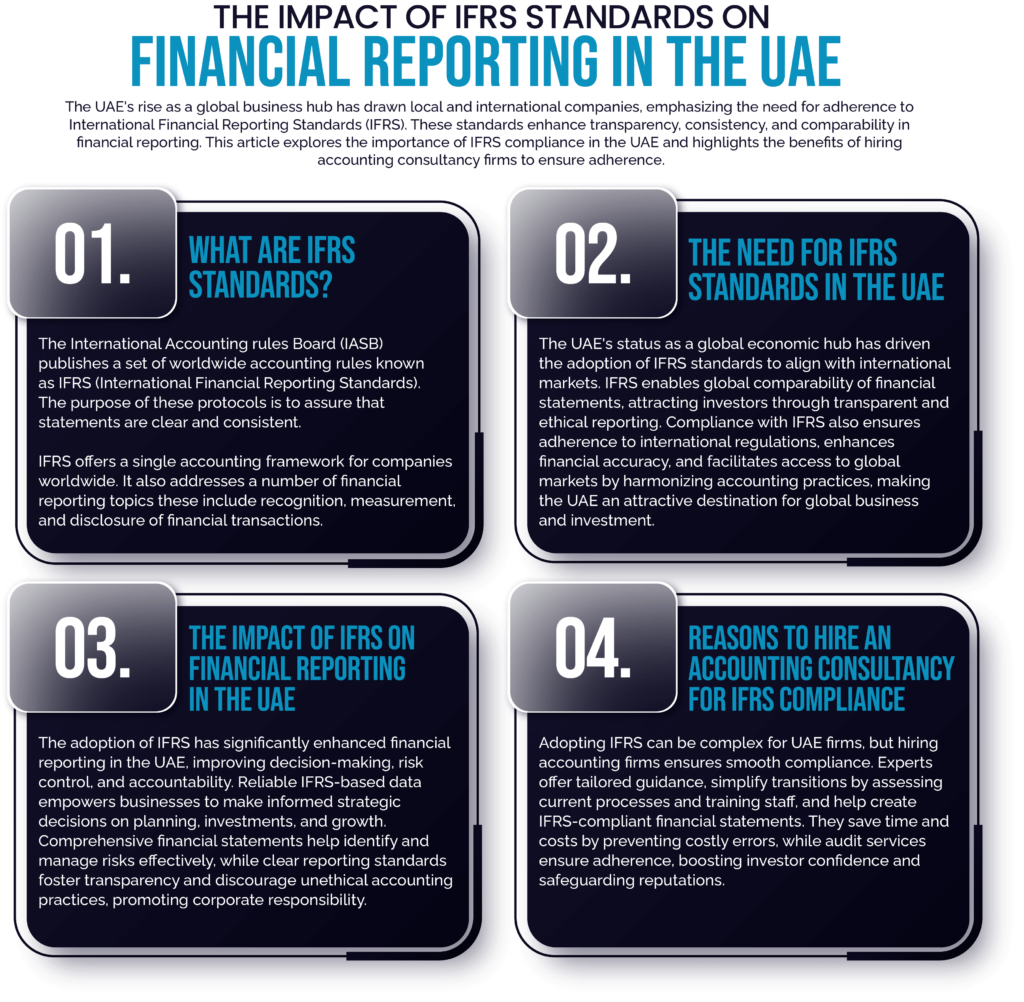The Results of IFRS Protocols on Financial Reporting in the UAE
The UAE has become a powerhouse. Now it attracts both local and international companies. As corporations aim for dominance, adhering to international financial reporting protocols such as the International Financial Reporting Standards (IFRS).
IFRS enhances transparency, comparability, and consistency in financial statements, making it vital for businesses operating in the UAE. This article delves into the impact and need for IFRS standards on financial reporting in the UAE and highlights the reasons and benefits for businesses to hire accounting consultancy firms to ensure compliance.
What Are IFRS Standards?
The International Accounting rules Board (IASB) publishes a set of worldwide accounting rules known as IFRS (International Financial Reporting Standards). The purpose of these protocols is to assure that statements are clear and consistent.
IFRS offers a single accounting framework for companies worldwide. It also addresses a number of financial reporting topics These include recognition, measurement, and disclosure of financial transactions
The Need for IFRS Standards in the UAE
The United Arab Emirates has become a popular location for companies across all industries due to its status as a significant global economic hub. Due to the country’s continued integration with international markets, businesses are now required to utilize IFRS standards.
The following are arguments in favor of IFRS’s in UAE financial reporting:
Providing Comparability Worldwide
IFRS has made it possible for businesses in the United Arab Emirates to compare their financial accounts to different companies across the globe. This is particularly important for businesses that trade internationally or want to invest abroad.
That’s because IFRS maintain that financial statements are in structure, investors, analysts, and other stakeholders can compare the financial performance of companies regardless of their country of origin.
Investor Attraction and Confidence
Gaining the favor of both domestic and foreign investors is one of the main reasons the UAE adopted IFRS.
IFRS enables transparent and trustworthy financial reporting, which reassures investors that companies are operating ethically and in accordance with global norms.
This boost in investor confidence makes it easier to attract foreign cash and investments, which are essential for growth in a competitive market.
Observance of International Regulatory Standards
Specific legislative requirements, such as the demand for financial statements prepared in accordance with IFRS, are brought about by the growing number of international firms and foreign investors operating in the United Arab Emirates.
Businesses with global connections, such as those that operate internationally or are listed on foreign stock exchanges
IFRS standards must frequently be followed by several jurisdictions. Significant Obstacles to conducting business internationally may arise from non-compliance.
Better Financial Accuracy
IFRS increases the accuracy and openness of financial reporting. It does that by requiring businesses to provide detailed information about their cash flows, performance, and financial status.
This level of knowledge helps stakeholders make decisions by improving their comprehension of the company’s operations, risks, and opportunities.
Facilitates Access to Global Markets
Following IFRS makes it easier for UAE-based companies to access global markets, particularly in regions where IFRS is a mandatory reporting requirement, such as Europe and parts of Asia.
This harmonization of accounting rules reduces the need for several financial reporting systems, which facilitates international commercial transactions.

The Impact of IFRS on Financial Reporting in the UAE
Improvement In The Decision-Making Capacity
Investors can have a more accurate view of a company’s financial status thanks to IFRS. By adopting IFRS, businesses can streamline their reporting processes and enhance their strategic decision-making.
When business executives have access to reliable financial data, they may make well-informed decisions on financial planning, investments, and expansion.
Improved Risk Control
IFRS-prepared financial statements are more thorough and offer a more profound understanding of a business’s financial status, including obligations, contingent liabilities, and financial risks.
This aids companies in evaluating their risk exposure more accurately, controlling financial risks more skillfully, and making plans for any obstacles down the road.
Greater Responsibility
IFRS’s structure of reporting standards encourage a surge in corporate accountability.
Businesses are less likely to use dishonest accounting techniques when there are clear rules about how financial transactions should be documented. This promotes an open and honest business culture.
This aids companies in evaluating their risk exposure more accurately, controlling financial risks more skillfully, and making plans for any obstacles down the road.
Reasons to Hire an Accounting Consultancy for IFRS Compliance
Expert Guidance
Accounting consulting firms may help businesses navigate the complexities of IFRS thanks to their specialized knowledge of the standards.
Given the specific operations, market dynamics, and industry of the company, these experts can offer guidance on how to implement IFRS regulations. They can also help clarify IFRS regulations to ensure accurate financial reporting.
Simplified Transition to IFRS The process of switching from local accounting standards to IFRS can be very daunting for firms. Accounting experts assist firms by offering a direction for the IFRS transformation.
This entails assessing present accounting processes. Along with that it includes spotting any gaps, training employees. Lastly creating financial statements that adhere to IFRS standards. They guarantee that companies minimize interruptions throughout the period of transition.
Productive Improvement in Time and Cost
Working with a competent accounting firm can assist expedite the process. It can also reduce the time and costs involved with compliance. Even though applying IFRS may need some initial investment.
A consultation can assist companies in avoiding expensive errors that could result in fines or harm to their reputation, such as improper implementation of IFRS standards.
Audit and Assurance Services
Accounting consultants can provide audit and assurance services to verify that financial statements adhere to IFRS.
By carrying out independent audits to check that the company’s financial statements are fully compliant. They give investors piece of mind.
A consultation can assist companies in avoiding expensive errors that could result in fines or harm to their reputation, such as improper implementation of IFRS standards.
Conclusion
IFRS standards are crucial as the UAE looks to become a worldwide leader in business.
The benefits of adopting IFRS, such as increased comparability, transparency, and investor trust, are invaluable for businesses aiming for global competitiveness.
Even though the transition to IFRS can be challenging, hiring an accounting consulting firm to assist with compliance can streamline the process, provide informed advice, and lower risks businesses in the United Arab Emirates can use the information
Employing accounting experts is not only a prudent choice, but also a requirement for sustained success and growth in a global economy that is getting more interconnected by the day.
MHR Chartered Accountants can help you launch your company. Our knowledgeable staff provides tax and advising assistance in addition to full accounting services in Dubai, guaranteeing a solid financial base and assisting you in navigating the regulatory environment of the United Arab Emirates for prosperous expansion.













